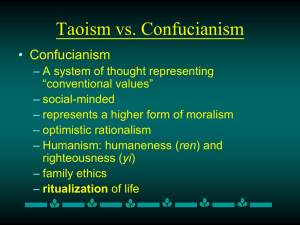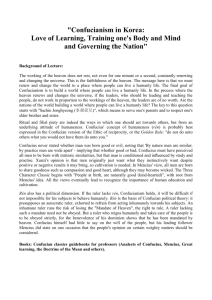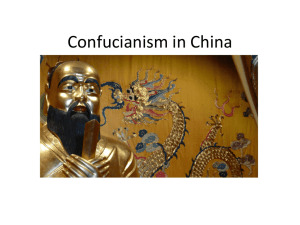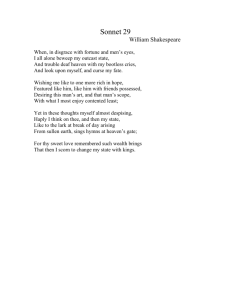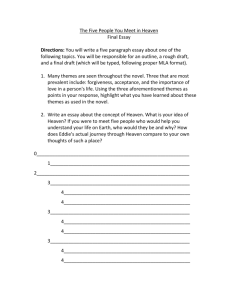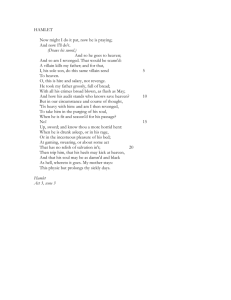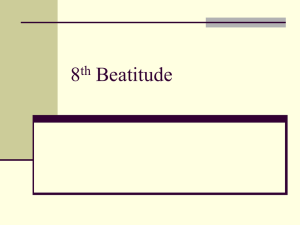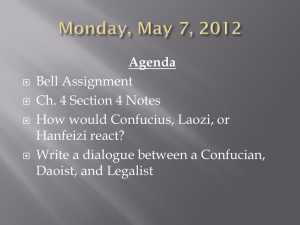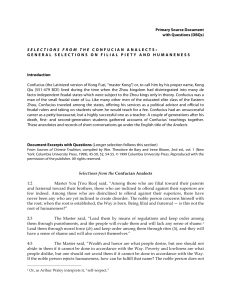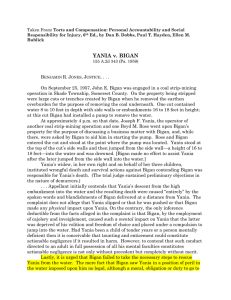Daoism
advertisement
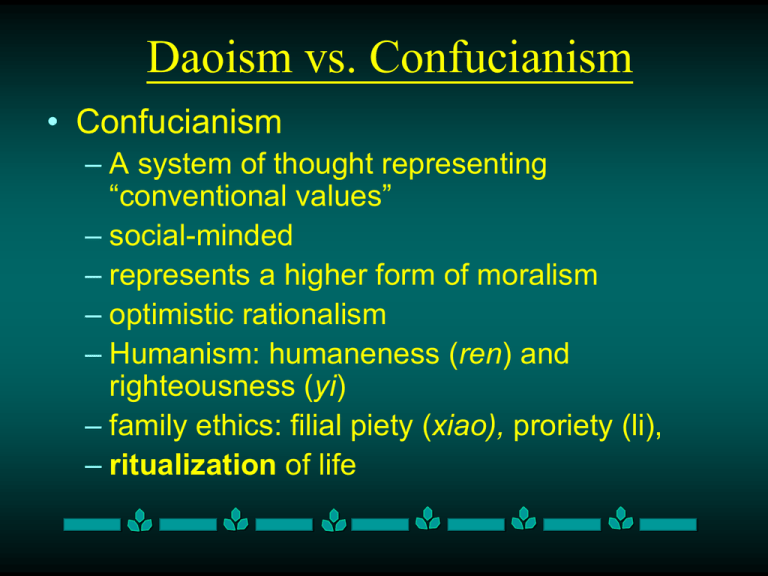
Daoism vs. Confucianism • Confucianism – A system of thought representing “conventional values” – social-minded – represents a higher form of moralism – optimistic rationalism – Humanism: humaneness (ren) and righteousness (yi) – family ethics: filial piety (xiao), proriety (li), – ritualization of life Confucian Views of Men and Society • a sage ruler (sage king) is needed to keep social and political order – Which is maintained by proper hierarchy – Example of modeled society can be found in a golden age in the past. • Man is the center of this mundane world • gentlemen (junzi) in gov’t to help rule the state • good government brings about good society • good individuals: humane and righteous • rites and music: – sacrifice and ritual – rules and regulations • family is the base of society and state – ethics and order – Education • Humanism Daoism (based on DDJ and ZZ) • Taoism/Daoism valued speculative thought • Questioned and often times repudiated Confucian values • rejected all other “artificial devices” of civilization • mocked ritual and propriety and decried group conventions • pessimistic about society • man is not capable of keeping order and safety in society • social man is a misguided being • • • • sought nature as refuge from man’s world scorned government, feared progress and civilization wary of technical skills naturalism Daoist Criticism of Confucianism Confucian Virtues and regulations humaneness and righteousness like web-toes, extra-fingers, and other physical superfluity not a part of human nature; their existence is of no meaningful value not attributes of humanity because they were used to pursue honor and wealth, thus were the sources of greed along with the rites and music, caused confusions in the world what made people “superior men”; what caused people to twist their nature and die for Good person one who accepts the given characteristics and knows his/her own self Lao-tzu’s/Laozi’s Critique of Confucianism • The person of superior integrity • Does not insist upon (display) his integrity. • The person of inferior integrity • Never loses sight of his integrity; • For this reason, he lacks integrity. • The person of superior integrity takes no action • Nor has he a purpose for acting • The person of superior humaneness takes action, • But has no purpose for acting • The person of superior righteousness takes no action • And has a purpose for acting • The person of superior etiquette takes action • But others do not respond to him; • • • • • • Whereupon he rolls up his sleves and coerces them When the Way is lost, afterward comes integrity. When integrity is lost, afterward comes humaneness. When humaneness is lost, afterward comes righteousness. When the righteousness is lost, afterward comes etiquette. Etiquette is the attenuation of trustworthiness, • And the source of disorder . • Foreknowledge is but the blossomy ornament of the Way, • And the source of ignorance. (TTC/ddj, 1/38) • Let there be a small state with few people, – Where military devices find no use; • Let the people look solemnly upon death, – And banish the thought of moving elsewhere. • They may have carts and boats, – But there is no reason to ride them; • They may have armor and weapons, – But they have no reason to display them. • Let the people go back to tying knots to keep records • Let their food be savory, their clothes beautiful, their customs pleasurable, [and] their dwellings secure. • Though they may gaze across at a neighboring state, – And hear the sounds of its dogs and chickens, • The people will never travel back and forth, – Till they die of old age. (TTC/DDJ, 30/80) • To Daoists, Confucian pursuit of knowledge • interfered with the innate characteristics of things • created distinction between men and other beings • men separated themselves from the birds and the beasts • treated the birds and the beasts as their possessions • created mechanic devices to hunt (or kill) animals and nature • complicated life, provoked debates, and divided people and all creatures • life should be as simple as “the simplicity of unhewn log” • caused contention for profits and fame • did not help people to realize and appreciate the Dao, but would move people away from the Dao More critiques • Confucian sages • the source of troubles in this world • created more harms than benefits • people do bad things in the name of humaneness and righteousness • the world would be in peace without the sage • abandon wisdom and abolish sagehood • forsake outer form and cultivate inner virtues Denunciation of Confucius • The Zhuangzi, chapter 29, “Robber Footpad” (Daozhi 盜 跖). • Daozhi: “Is not this fellow Kong Qiu, the clever hypocrite from the state of Lu? Tell him for me, “You make speeches and compose phrases, recklessly citing kings Wen and Wu. You wear a cap decorated with twigs and branches and a cummerbund of dead ox hide. You are wordy and prone to exaggerate. You eat without plowing, dress without weaving. You flap your lips and wag your tongue, presumptuously fabricating right and wrong, thereby confusing the rulers of all under heaven what is fundamental. Your recklessly propound filial devotion and fraternal duty, yet try your luck with the feudal lords, the wealthy, and the honored. Your crimes are great, your • offenses enormous. Go back wehre you came from quickly! Otherwise, I’ll supplement my lunch with your liver.” (p.300) • “Come before me Hillock! If what you say goes along with my thoughts you will live, but if it goes against what’s in my mind you will die.” (p. 300) • “Come before me, Hillock. Those who reprimand with gain and remonstrate with words may all be said to be stupid and crude commoners. To be tall and big, to be handsome and good, and to please those who see me--these are virtues inherited from my parents. Even if you had not praised me for them, do you think that I wouldn’t have known about them myself?” (p.301) • “Moreover, I have heard that those who are fond of praising others to their face are also fond of slandering them behind their back. Now, your telling me about a great city and multitudes of people is because you want to reprimand me with gain and treat me as a commoner. How could that last long? The greatest city cannot be greater than all under heaven. Yao and Shun possessed all under heaven, but theirs sons and grandsons did not even have land enough in which to stick an awl, Tang and Wu were established as sons of heaven, but their later generations were severed. Wasn’t this because their gains had been great?” (p.302) • “Now you, sir, cultivate the way of Wen and Wu; you manipulate the disputations of all under heaven to instruct later ages. With your ample robe and broad belt, your dissembling words and fraudulent conduct, you confuse and delude the sovereigns of all under heaven, • wishing thereby to seek wealth and honor. There are no greater robbers than you, sir. Why don’t all under heaven call you Robber Hillock instead of calling me Robber Footpad? With your sweet phrases, you persuaded Zilu to become a follower of yours. You had him get rid of his peaked cap and remove his long sword, so as to receive your instructions. All under heaven say that Confucius can stop tyranny and prevent wrongs. In the end, however, when Zilu wished to kill the Lord of the Wei, the affair miscarried and they displayed his pickled corpse on the east gate of Wei. This shows the imperfection of your teaching, sir.” (pp.302-303) • “Do you call yourself a nobleman of ability and a sage? But you were twice driven out of Lu, had your traces oberated in Wei, were isolated in Qi, and were beseiged in the area of Chen and Cai, leaving no place under heaven where • your person might be accommodated. It was your instructions that brought upon Zilu this calamity of being pickled. You, as superior, can do nothing for your own person, and your subordinates can do nothing for others. Is your way worth honoring, sir? (p.303) • “There is no one whom the world esteems as much as the Yellow Emperor, but even the Yellow Emperor was unable to perfect his virtue and fought in the wilds of Zhuólu, causing blood to flow for a hundred tricents. Yao was unkind, Shun was unfilial, Yu was partially withered, Tang banished his sovereign, and King Wu attacked Zhòu …These are the six men whom the world esteems, but if we discuss them thoroughly, they were all deluded by gain and forcefully opposed their own emotions and natures. Their conduct is thus quite shameful. (p.303) • “Those whom the world considers worthy noblemen include Bóyí and Shúqí took leave of the Lord of Gūzhú and starved to death at Shou’yang Mountain, their bones and flesh remaining unburied. Bao Jiao glamorized his ocnduct and criticized the world, but he died with his arms wrapped around a tree. When Shentú Dí’s criticism went unheeded, he threw himself into the river carrying a stone on his back and was eaten by fishes and turtles. Jie Zhitui, being of utmost loyalty, cut flesh from his own thigh to feed Duke Wen. When Duke Wen later turned his back on him, Zhitui became angry and went away, wrapping his arms around a tree and being burnt to death. Tailborn had an appointment with a girl beneath a bridge, but the girl did not come. The water rose, but he would not leave, and he died with his arms wrapped around a pillar of the bridge. These six men were no • different from a dog whose carcass is hung outside the door to ward off evil spirits, a pig that is sacrificed to the god of the river, or a starved beggar who has frozen to death in a ditch but still holds his alms gourd. They all put a premium on fame and despised death, paying no regard to the fundamental nourishment of their alloted life span. There are none whom the world considers such loyal ministers as Prince Bigan and Wu Zixu. Yet Zixu’s body was cast into the Yangzi River and Bigan’s heart was cut open. The world considered these two men loyal ministers, but in the end they were laughed at by all under heaven. Judging from the above cases, down to Zixu and Bigan, none are worth honoring. • As for what you’re trying to persuade me with, if you tell me about the affairs of ghosts, that’s something I can’t know anything about; if you tell me about the affairs of men, it’s no more than this---what I have already heard about and know. (pp.303-304) • “Now, sir, I shall tell you about human condition. The eyes desire to see colors; the ears desire to hear sounds; the mouth desires to taste flavors; the will and vital breath desire fulfillment. Man’s highest longevity is sixty. If we exclude illness, death, and dread, the days that remain on which we can open our mouths to laugh amount to no more than four or five in a month. Heaven and earth are timeless, but the death of man is fixed in time. If we take an entity that is fixed in time and entrust it to timelessness, its brevity will be no different from that of Piebald Thoroughbred passing a crack in a wall. • None who are unable to gratify their volition and to nourish their allotted life span are in communication with the Way.” (p.304) • “Everything you have spoken, Hillock, is what I have rejected. Go back immediately. Speak no more! Your way is a frenzied and frantic affair that is deceitful, clever, vain, and hypocritical---not what can be used to fulfill the truth. It’s not worth discussing.” (pp. 304305) Avoid Bipolarizing Daoism and Confucianism Soft vs. Hard Yin vs. Yang Positive vs. Nagative Optimism vs. Pessimism Daoist side of Confucius The Analects 2:1 (p.63) The Master said, “The ruler of virtue can be compared to the Pole Star which commands the homage of the multitude of stars without leaving its place.” The Analects 3:7 (p.68) The Master said, “There is no contention between gentlemen. The nearest to it is , perhaps, archery…. The Analects (V:7, D.C. Lau) The Master said, “If the Way should fail and I were to put to sea on a raft, the one who would follow me would no doubt be You (Zilu). Zilu, on hearing this, was overjoyed. The Master said, “You has a greater love for courage than I, but is lacking judgement.” The master said, “In the eating of coarse rice and the drinking of water, the using one’s elbow for a pillow, joy is to be found. Wealth and rank attained through immoral means have as much to do with me as passing clouds.” (7:16) “Dian, how about you? After a few dying notes came the final chord, and then he stood up from his lsue. “I differ from the other three in my choices.” The Master said, “What harm is there in that?” After all each man is stating what he has set his heart upon.” “In late spring, after the spring clothes have been newly made, I should like, together with five or six adults and six or seven boys, to go bathing in the River Yi and enjoy the breeze on the Rain Alter, and then go home chanting poetry. The Master sighed and said, “I am all in favor of Dian.” Was Taoism a “School”? Problems of Traditional Taxonomies no clear indication of community in strict sense of the word Unclear about schools, master-disciple transmission Show only individuals and fragmentation of transmission over generation inevitably misinterpreted classical teachings argued for the writers’ favorable system of thought. likely to engage in “the invention of tradition” inaccurately identified tradition, for instance, grouping Huangdi and Laozi as Huang-Lao school. Claims of revealed texts (in Han times) were often connected to Daoism What defines Daoism? the knowledge of natural categories the manipulation of yin-yang correlations, the concepts of self-cultivation taught by Laozi and Zhuangzi empirical knowledge of plants and herbs, etc. Did a Confucian community, Ru community, exist as was told by Han historian? What defines their identity? Their ritual criteria of value vs. economic criteria of value. Other Schools? Did a Mohist community exist? What defines Mohist community? Strong sense of communal life; Community stood as a big family characterized by strict hierarchy and sense of brotherhood. Sacrifice for the community was encouraged. The community maintained its own legal code separate from the state Stressed military defense skills for self-protection and survival
